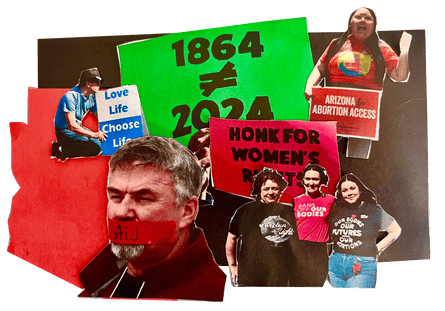I’ve been practising medicine and providing abortions in Arizona for the last 29 years. When I first opened my own clinic in Phoenix back in 1999, getting an abortion was relatively straightforward. But over the past two decades, Arizona’s Republicans have tried to make it as difficult as possible for women to terminate a pregnancy. When the state goes to the polls on 5 November, we’ll be voting not only on who becomes president, but on whether abortion is a constitutional right. In a historically Republican swing state where Donald Trump is only just ahead of Kamala Harris in the polls, as many as 22% of respondents named abortion as their most important election issue.
That’s not surprising, given what is required to end a pregnancy in Arizona today. There are just nine abortion clinics in a state of more than 7 million people. Since pharmacies and physicians in Arizona aren’t allowed to send out abortion pills by post, women must travel to visit one of these clinics in person. A state-mandated “information session” describing the risks of the procedure is required at least 24 hours before every abortion (even though the procedure is usually far safer than childbirth). Federal law means most abortions aren’t covered by Medicaid, so they cost between $600 and $1,000 (£500-£770), plus two days off work, plus the cost of travelling across the state, plus two nights’ accommodation.
Perhaps that’s affordable if you have a decent job. But it’s not if you’re poor. “Pro-choice” is no longer an apt description for abortion access in Arizona, because while the procedure is technically legal up to 15 weeks (unlike in Texas, for example), many women aren’t in a financial position to make that choice. The New York Times recently ran a story showing that 171,000 women in the US travelled out of state for an abortion last year. Some travelled hundreds or even thousands of miles for a procedure that usually takes less than 10 minutes. Women are furious that it’s come to this, and they will channel their fury at the ballot box.
Arizona has long been considered a Republican stronghold, but the vast majority of people support women’s reproductive freedom, and Republican lawmakers have not been voting with with their constituents. Organisations funded by the Christian right, such as the Center for Arizona Policy, have lobbied state Republicans to adopt increasingly extreme positions. This is the political climate that led to the Dobbs decision, a 2022 supreme court ruling that there is no constitutional right to abortion, and it’s why so many of us worried that Arizona was going to revert to a full ban on abortion. Without the protections of Roe v Wade, the state could have returned to an 1864 law that banned abortions even in cases of rape or incest.
Thankfully, our state legislature voted to repeal the 1864 ban earlier this year. And the anti-abortion lobbying that culminated in the Dobbs decision has only made people more aware of what they stand to lose. When I wear my T-shirt printed with “Abortion is healthcare” to my local pilates class, women give me a thumbs up. It’s ironic, really: having fought to make abortion nearly impossible, Arizona’s Republicans may now have cost themselves the election.
Last month, I watched the presidential debate at home with my family. Joe Biden had dropped out, thank God, and there was an incredible optimism about Harris. She is unafraid to use the word “abortion”, for one thing. Biden rarely talked about it. Obviously, he was supportive of women’s rights, but he never seemed comfortable using that word. Nor did Hillary Clinton. So hearing Harris talk about our rights to reproductive freedom and bodily autonomy is deeply refreshing. With Dobbs, Harris has found her voice.
On the night itself, Trump resorted to making wild claims, arguing that the Democrats were “executing” babies. “Nowhere in America is a woman carrying a pregnancy to term and asking for an abortion,” Harris shot back. “That is not happening. It’s insulting to the women of America.” She was calm and articulate, while he seemed increasingly unhinged. She spoke of women suffering from miscarriages, of the physical pain that they’re experiencing. Her frankness about patients’ suffering – at one point she told the story of a woman who was denied emergency care and ended up bleeding out in her car – was a reminder that the country we live in now is different to how it was in 2016 or 2020. Women’s reproductive rights have been trampled on, and we have to be open about what this means.

The debate was an early indication of the gender split in this election. A recent NBC poll found men favour Trump over Harris 52% to 40%. With female voters, Harris leads Trump by 58% to 37%. I often say that there’s a man involved in every pregnancy, and I’m glad to see that some men are being more vocal about abortion rights. Still, it’s striking that while women are pulling away from Trump, men are gravitating towards him. A vote for him seems like a vote for a type of masculinity that sees feminism as toxic and regards men as the truly oppressed. How else to explain the appeal of a man who boasted of grabbing women “by the pussy”?
The strange thing is how out of step the Republicans now are with public opinion. Perhaps that’s why Melania Trump recently claimed to be passionately pro-choice. The Trump campaign is flailing over abortion, and now seems to be frantically trying to project a more reasonable image. Yet the Republican commitment to minimal government has always sat uneasily with their anti-abortion stance. If you’re a Republican, it’s possible to think that you should be able to carry an AK-47 without the government interfering, and think that the government should interfere in a woman’s decision over whether to carry a child, and not to see any contradiction between these two stances.
Even on their own terms, anti-abortion laws don’t work. Countries that ban abortions don’t have fewer abortions; they just have a larger number of unsafe abortions. If Republicans really wanted fewer abortions, they would fund more sex education and free contraception. As it stands, many want to ban birth control, an issue on which Trump has flip-flopped. This dissonance only makes sense when you realise that anti-abortion laws aren’t really about abortions. They’re about controlling women.
It’s now just a few weeks before the election. If you ask me which way I think Arizona will vote, I’d say blue. I live in Flagstaff, a city north of Phoenix, and traditionally a more conservative place than the capital. But there are Harris signs everywhere in people’s windows and front yards. We need a secular government that doesn’t interfere with people’s medical decisions, or impose its radical religious beliefs on the population. I’m feeling optimistic: I think people are seeing Trump for who he really is, and for how dangerous a second Trump presidency would be.
-
Gabrielle Goodrick is a family healthcare physician and the owner and founder of Camelback Family Planning

 8 months ago
8 months ago
 (200 x 200 px).png)








 English (US) ·
English (US) ·